 |
|
|

|
2007
May
29-31
|
Cleaning out the inbox
This is a busy week, so I'll close out the month of May now with a series of short items.
Daily entries will resume in June.
Here is
how to make a
custom plastic lens cap of any size (by thermoforming the plastic),
courtesy of Pete Albrecht. Pete made a Hartmann mask, which is a lenscap with
two holes in it. It's a focusing aid; with a Hartmann mask attached to a telescope, you see double
images when it's out of focus. Plastic-working is a rare workshop skill, but why
shouldn't we make things out of plastic as well as wood and metal?
Learning Hebrew? Here is the Bible
(Old Testament) in Hebrew with recordings of it being read aloud. Useful.
Incidentally, is there a New Testament in Hebrew? The NT was originally written in Greek,
of course, but it was translated into Biblical Hebrew by
Franz Delitzsch in the late 1800s.
It's on line here.
Incidentally, when looking at Hebrew on the web, I often notice that the vowel o, which
is written as a dot, produces a needless space between letters, making one word look like two.
I see this both in the Delitzsch NT (look for example at Matthew 1:1) and the Hebrew Bible
that I mentioned earlier. Windows typography problem?
Descending to more worldly matters,
are home-equity loans evil?
See the contrasting opinions
here
and
here.
Bottom line: The next big issue in personal finance may be people who got in over their heads
borrowing against their houses for nothing in particular (e.g., for steak dinners and other
things economists call current consumption).
Personal-finance pundits say, "No, don't borrow against your equity, you'll lose your house!"
That assumes you have trouble paying your bills.
Or, worse, that you're counting on eventual
bankruptcy as a way to leave your creditors holding the bag
(credit-card debts are easy to dispose of that way, but debts with liens on houses are not).
Then there are people who seem to think of "cashing in the home equity" as income
rather than debt — it is definitely debt and has to be paid back!
As for myself — I plan to pay my debts, and given the choice of borrowing
against my house for 8.5% or against nothing at all for 20%, I'll choose the former.
For major things of enduring value, such as education, of course, not for current consumption.
Still on the financial pages,
the
market for "McMansions" is collapsing.
A McMansion (as common as a McDonald's hamburger) is an oversized, cheaply built but superficially
luxurious house on an undersized lot.
McMansions were popular during the era of super-low interest rates, and frankly, most of the yuppies
who bought them probably did not intend to stay in them when interest rates went up —
instead, the tactic was sell to a Bigger Fool.
(The "Bigger Fool" theory of investing usually applies to gold coins and the like, but
this time it was houses.)
Voilà — everybody's interest rates went up at the same time,
and all those McMansions are for sale.
How many will be torn down to build condos?
McMansions were also a form of conspicuous consumption rather like buying a Hummer to drive
in town. It's something you don't need and don't even truly want, but you buy it just to impress
others. I don't play that game.
As regards Mc-this and Mc-that,
McDonald's
is petitioning the Oxford English Dictionary
to take out or redefine the word McJob, which they think is derogatory.
I think the dictionary publishers should stick to their guns.
The dictionary is not an advertising medium.
Its job is to tell the truth about what words mean, who uses them, when they've been used, and so forth.
If dictionaries start being censored by companies that want to improve their image,
what's next? Political censorship too? Redefine Watergate?
More precisely, the dictionary publisher's position should be:
"We are telling you what people mean when they use this word.
That does not mean we agree with what they are saying
or endorse their view of the world."
The Oxford English Dictionary is very much a descriptive book; unlike Merriam-Webster
products, it doesn't tell you how to speak or write, it tells you how other people have spoken or written
(especially in influential books, other literature, plays, movies, etc.),
and you can do the same thing if you want.
The American Heritage Dictionary has the same virtue.
Permanent link to this entry


|

|
2007
May
28
|
Graduated!


Permanent link to this entry


|

|
2007
May
27
|
Congratulations, Sharon!
|
Today (May 27) is Sharon's high-school graduation day.
She is leaving behind the green and white of Athens Academy
and will enter Emory University this fall.
Sharon, may God bless the journey you have before you.
|
Permanent link to this entry
How to tie a tie
Just before Athens Academy's Honors Day ceremony on Friday, I wound up giving a brief
seminar on how to tie a necktie, in the men's room. (One of Sharon's friends needed
help, and several more joined us...)
Anyone wondering how to tie a half-Windsor knot should look
here.
Permanent link to this entry
Plato and the Alpine Valley

A couple of hours after taking the moon picture you saw yesterday, I recorded two and a half minutes
of video of this lunar scene
through the telescope, then used RegiStax to select, stack, and enhance the 2000 sharpest frames.
Here's the result. The large, dark-floored crater is Plato; to the right is a canyon
called the Alpine Valley which may have been made by a meteor striking the mountain range
at a low angle. Not a masterpiece of lunar imaging, but not too bad for a 5-inch telescope.
Permanent link to this entry


|

|
2007
May
26
|
Is high school a parody of college?
 I think I've cracked a cultural-historical mystery that had puzzled me for years:
Why does the American high school experience mirror the college (university) experience,
with the same duration,
the same names for the four years (freshman, sophomore, junior, senior)
and a very similar graduation ceremony, complete with academic gowns
and occasional use of the word "baccalaureate"?
I think I've cracked a cultural-historical mystery that had puzzled me for years:
Why does the American high school experience mirror the college (university) experience,
with the same duration,
the same names for the four years (freshman, sophomore, junior, senior)
and a very similar graduation ceremony, complete with academic gowns
and occasional use of the word "baccalaureate"?
I knew already that the bachelor's degree (baccalaureatus) was the
lowest degree granted by the medieval universities.
Students arriving at the universities in those days often had very little prior education.
With the rise of secondary school (high school) in the 1800s and 1900s, different
countries took different paths.
The British see secondary school as a preparation for the university.
Britons do not "graduate from high school," they "leave school" after passing various examinations.
Then they can study for a bachelor's degree at a university, followed, if they wish, by
a master's degree or doctorate.
The French have a different system. For them, high school is the
bachelor's degree (baccalauréat).
The French university system technically consists entirely of graduate students;
everybody comes in with a baccalaureate and studies for a "licentiate," optionally
followed by a master's degree or something higher.
We Americans have combined the two systems.
At the end of high school we award something that looks like a baccalaureate
(except we just call it a "diploma"), and when people complete the first university
degree, they get a real baccalaureate (bachelor's degree).
The similarity is more than skin deep.
Just like high school, an American (not British) bachelor's degree includes a
broad education in numerous subjects other than the student's chosen field.
This is good for students who went to weak rural high schools.
But a student who goes to a good high school followed by a mid-quality university
can easily feel that something's being done to him twice.
Permanent link to this entry
Luna gibbosa

The full face of the Moon is hard to photograph.
It's too big to fit on the sensor of a vibrationless CCD camera (at least the ones I can afford),
and the exposure times are usually such that the shutter vibration from an SLR is a serious problem.
For this picture, I used several tricks to get reasonably good results.
The telescope was my vintage Celestron 5 with an f/6.3 compressor, both to flatten the field
and to give me short exposures. The exposure was 1/500 second to try to "stop" the vibration.
I took three pictures with
different ISO settings and combined them with RegiStax, then used Photoshop for
further enhancement.
The result is presentable though not great.
Permanent link to this entry


|

|
2007
May
25
|
A few points of economics
The House of Representatives is has voted to ban
gasoline price-gouging.
My question is, what is the difference between "price-gouging" and
the operation of a free market?
When something becomes scarce, do you want the price to go up,
or do you want shortages? Those are your only two choices.
This is absolutely basic economics, even if it hasn't dawned on the Democrats.
Of course, price manipulation based on collusion, conspiracy, or deception should
be banned. But the proposed new law is so vague that if it passes the Senate, I don't
expect it to hold up in court.
Minor update May 25.
One of my heretical opinions is that university parking should be more expensive.
It should be expensive enough to pay for building enough parking lots and decks.
Try to keep it cheap, and you'll have a perpetual shortage.
Either that, or you'll make people pay for it that don't want to. Why should other
people pay for me to have a place to park? I tend to think that if you can afford
a car, and gasoline, you can also afford a place to park it. And asking parkers to pay their
own way is doubly important if you want people to have an incentive to carpool or use
public transportation.
Lots of Americans expect "free parking" everywhere they go. That's largely because they
only go to shopping malls, where the cost of the parking is paid for by the markup
on the merchandise.
Universities could offer free parking too, if they raised
every student's tuition and lowered every employee's salary. That's probably not what anybody
wants them to do.
But I still encounter people who seem to think the University has some other
source of wealth that it could use to "make parking free for everybody." That's just not
how money works, and I wonder if these people can balance their own checkbooks.
I also think universities should provide parking, not just "hunting licenses."
A permit to try to find a parking space can be worse than useless.
As Cathy points out, if it takes you 5 minutes to park most days, but 30 minutes
some days, then you have to allow 30 minutes every day.
And what are you supposed to do if you find all the suitable parking lots unexpectedly full?
Skip class? Even if you're the teacher? That came perilously close to happening
to me in the late 1980s.
One helpful approach might be layered pricing, where for an extra fee (not a fine)
you could use special parking spaces on days of unusual congestion. Maybe set aside 5% of
each parking lot as "premium parking" that costs $5 per use (automatically billed to your
account by the same people who patrol for parking violators), for those occasions when the
regular part of the lot is unexpectedly full and you don't have time to go to a different one.
But it it more important to have enough parking in the first place.
There aren't any students who don't need to be there! A university can't turn away customers
the way a shopping center or theater can.
Finally, I think the size of the vehicle should be taken into account.
I don't mean everyone should be driving Mini Coopers, but anything appreciably bigger
than a mid-sized car should pay extra,
and maybe be restricted to a limited set of lots,
because it occupies more space.
There are places you just can't fit a large SUV, a van, or a larger-than-standard
pickup truck.
I am glad to say that the University of Georgia has taken some steps in these directions
over the past few years. There are pay-by-the-hour parking decks in several areas of campus,
and the student and faculty parking situation is generally better than it was. Twenty
years ago, they really did run a "hunting license" system where parking was cheap and
unreliable.
The Feds are going to
require better
disclosures of credit-card fees.
But they may be leaving too many loopholes.
More on this later, after I've read all the documents.
It's a good idea to require the lender to disclose the effects of making only the minimum payment,
but this
must be based on the customer's actual balance and interest rate,
not a hypothetical example that might be a much better deal.
As a linguist, I'm intrigued by another aspect of the new regulations, which is that
they are correcting for some semantic shifts.
For example,
now that computer programming is widely known, most people understand default
as meaning "what you get if you don't make another choice."
In banking, however, default has traditionally meant "not make your payments."
So the term default rate (interest rate for people who miss payments)
is being changed to penalty rate.
Also, I gather they're going to insist that lenders can only say fixed rate if
the interest rate cannot be changed for any reason. Go, Feds!
Finally, have you noticed that
everybody complains about $4 gasoline and nobody complains about $4 coffee?
I'm not one of the Fourbucks
crowd. I don't like coffee at all.
And I'm a little wary of the
critter on the Starbucks logo,
which is, I gather, some kind of Norse sea monster.
Permanent link to this entry


|

|
2007
May
24
|
An end to spam?
It finally looks as if a proposal for
authenticated e-mail
is going to get off the ground.
We needed it 15 years ago.
It's called DKIM.
Details are
here.
Spammers almost always falsify where their e-mail is coming from.
And the trouble with the Internet is that it was designed, decades ago, for use in a
laboratory environment.
One of the core values of the Internet is that it should be
very easy to put a computer on the network.
Historically, that has meant that you can just say who you are and where you are,
and the whole Net will believe you.
Another core value is lack of central control. The Internet originated as a
Defense Department network designed to be especially good at surviving attacks.
It has no headquarters, no central node that an enemy could take out.
And that is a Good Thing.
The result, of course, is that there is no central place where fraudulent communications
could be intercepted.
Instead, the new authentication scheme relies on digital signatures by which the sending sites will
prove that mail is authentic.
A digital signature is based on public-key cryptography, a method of encoding and decoding
messages with two keys (passwords) which cannot be deduced from each other.
The idea is that you give out your decoding password freely
(in fact, you list it in authoritative directories where anybody can look it up)
but you keep your encoding password
to yourself. Then you are the only person in the world who can encode messages which will decode
correctly with the password you've given out. Short messages of this kind can serve as proof that
you really sent them.
You'll notice that there's no digital signature on my e-mail at present.
I haven't jumped on that bandwagon because I don't think individuals are the level
at which more security is needed. We need to authenticate sites.
If you can be sure my mail came from covingtoninnovations.com, or uga.edu, or bellsouth.net
(the 3 sites through which my e-mail can enter the Net), then the managers of those sites
can take care of authenticating me, should the question ever come up.
Mainly, we don't want an impostor halfway around the world to claim to be at one of these sites.
I expect some people to oppose the new authentication scheme.
Mostly, they'll be spammers.
But some will wrap themselves in Internet patriotism and the notion that
the Net "ought to be free," and if you start requiring authentication, then some impoverished
university in some tiny
Third World country will suddenly be unable to get on the Net, and freedom will be stifled.
My response? After authentication becomes standard practice, people can keep sending
unauthenticated mail if they want. But I don't promise to read it,
or even see it.
Permanent link to this entry
And now we've gone multistate

On the morning of the 23rd, the smoke from the Okefenokee fire was blanketing Alabama
and part of Tennessee,
with incursions into Mississippi and Kentucky. How soon will it cross the
Mississippi River? Will it invade Mexico? Or is it making for Chicago now?
Permanent link to this entry


|

|
2007
May
23
|
Wildfires still visible from space
Uploaded early. Read tomorrow's news today, or at least today's news...

The Okefenokee swamp wildfires are still burning, and Tuesday morning
they formed a smoke plume almost as big as the state of Georgia (which is the largest state east
of the Mississippi, larger than England and Wales together).
This smells as bad as it looks. Cough, cough!
Click
here to check current satellite images (during daylight only).
The smoke does not show up on the infrared images, which are usable 24 hours a day.
Permanent link to this entry
Did I violate the Windows Vista license by dual-booting?
A surprise in the end-user license agreement
Not long ago I went to a store, bought Windows Vista Ultimate Upgrade Edition,
came home, and set up my PC to dual-boot XP (which was already on it) and Vista.
I had previously set up Vista Release Candidate 1 the same way; that was a
date-limited preview edition that Microsoft sold to software developers very cheaply
before Vista was finished, so that we could start doing tests with it.
The other evening it was pointed out to me
in a newsgroup discussion
that the
Vista Upgrade EULA
contains this passage:
|
13. UPGRADES. To use upgrade software, you must first be licensed for the software that is eligible
for the upgrade. Upon upgrade, this agreement takes the place of the agreement for the software
you upgraded from. After you upgrade, you may no longer use the software you upgraded from.
|
So it sounds like my dual-boot setup is illegal.
That struck me as a little odd, for two reasons.
First, Vista willingly set itself up in a dual-boot configuration and performed numerous legitimacy checks.
Second, traditionally, software upgrade licenses do not compel you to stop using the earlier version as long
as you use only one of them at a time, so I wondered if Microsoft meant to say something other than what they
actually said. (But they did have the same provision in the Windows 2000 and XP upgrade licenses, so if it's
a fumble, it's a long-established one.)
But then I found out why despite harsh-sounding accusations
I am actually in the clear:
I was not upgrading Windows XP, I was upgrading Windows Vista RC1.
RC1 is a time-limited standalone license and you are explicitly permitted
to use an upgrade license to convert RC1 into commercial Vista Ultimate.
Microsoft says so.
And of course RC1 was itself a standalone installation, not an upgrade of XP,
and hence perfectly OK to dual-boot with XP or anything else.
So the few dollars I spent on RC1 were money well spent.
Permanent link to this entry
Windows Vista bargains
If you want to install Vista on just one computer,
you should buy the System Builder version, not the upgrade — it's cheaper.
The System Builder edition is not transferable to another computer, nor does it have
full end-user support from Microsoft (but who uses that anyhow?).
It can upgrade another version of Windows, as well as doing a clean install
or even a dual-boot setup (if you have a separate partition or disk drive ready for it).
Presently, Vista Ultimate (32-bit) in this format costs less than $180
from Amazon.
(If you have a Pentium D or other 64-bit CPU, get the
64-bit edition.)
Even cheaper are
Vista Business 32-bit
and
64-bit and
Vista Home Premium 32-bit
and
64-bit.
I do not recommend Vista Basic in a world
in which you can still get Windows XP.
Permanent link to this entry
Legal documents are not computer programs
A point I made in that newsgroup discussion, which bears repeating here, is that
legal documents are not computer programs.
They do not inexorably and automatically cause things to happen exactly as stated.
This point is often lost on computer programmers who are having their first encounter
with legal controversies.
Computer programs are designed to be semantically context-free — the operation
of each part depends only on a few other parts, which are explicitly named.
By contrast, every law and every document exists in the midst of a web of
context and precedent.
Every paragraph in every contract is affected, at least to some
extent, by other contracts, by applicable laws, and by
other indications of the parties' intent.
Thus I continue to question whether paragraph 13 of
the Windows Vista EULA
actually says
exactly what Microsoft intended to say, or what it would be in Microsoft's best interest to say.
I think what they meant is that an original license plus an upgrade are still only one license.
You can't take the original software away and use it somewhere else after upgrading. But I don't see
why they would want to prohibit people from using old and new versions alternately on the same computer.
That is often necessary while checking compatibility.
Microsoft has been known to
revise the EULA
to change unpopular provisions and clear up controversial points. Maybe paragraph 13 is
due to be revised.
I have had some very frustrating exchanges, in newsgroups, with people who think I'm either stupid,
or determined to cheat Microsoft, or both.
It's tiresome dealing with accusatory assertions made by people who do not speak for Microsoft, and do not have
legal (or even business) expertise, and do not cite sources of information.
Permanent link to this entry


|

|
2007
May
22
|
Miscellany
Don't spend all your time driving around:
Now that gasoline prices have reached an (inflation-adjusted) all-time high,
maybe the Atlanta 60-mile commute will start to go out of fashion.
A major factor in the economy where I live is that people buy houses in
outlying towns and commit themselves to driving an hour and a half every
morning and evening. That's 3 hours a day of stress and danger.
If you're reasonably healthy, one of the best ways to increase your
life expectancy is to stop spending so much time in automobiles,
especially on Atlanta's freeways, where speed limits are not enforced.
We need to build places of employment nearer people's homes — and build
good homes and neighborhoods near their places of employment.
Unfortunately, for the past 50 years, a lot of people have felt that there
must be no businesses within 3 or 4 miles, at least, of their dwelling.
I have had neighbors ask me to contribute hundreds of dollars to fight
the development of an office park 1.3 miles away.
Mapquest follies: To determine the distance I just quoted, I used Mapquest
to get directions to the aforementioned office park. (Actually, to the intersection
of Timothy Road and Epps Bridge Road.) Here's the route it produced (I'm approaching
from the right). I know exactly what kind of programming error can lead to
this kind of thing, but it's still amusing to see it happen.
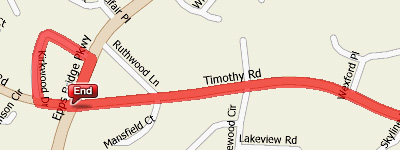
(There are no one-way streets or trick intersections to account for this.)
BWAAAAAAAHHHH! A telemarketer who calls you up and plays the sound
of a ship's horn before saying anything?
See Cathy's true-life report.
Cry "Havoc!" and parachute the dogs of war:
Only in the
Soviet Union..
Fair misuse: Copyright law allows you to quote small portions of any published work
for purposes of criticism or parody. (You must actually make a critical or humorous point, not merely
produce a condensed substitute for the original work.) Taking this concept to extremes, a Bucknell University
professor has produced
this video.
Metadata in AVI files: The format of AVI video files allows you to insert blocks of any type of data.
(Even, I suppose, another AVI file, if you have a sufficiently twisted mind.)
For a Covington Innovations consulting project, I've been using this facility.
Here
is some discussion of how to do it using DirectShow.NET,
which is a set of .NET interfaces to the DirectShow COM library.
Permanent link to this entry


|

|
2007
May
21
|
Moon and Venus
The Moon and Venus were close together in the sky on Saturday evening (May 19) and
I took a couple of pictures. Both of these were done with a Canon Digital Rebel XTi
on a tripod with a Canon 300/4 telephoto lens and processed with Photoshop.


Scroll down to yesterday's galaxy picture, too.
I've adjusted the brightness to make it easier to see the galaxies.
Permanent link to this entry


|

|
2007
May
20
|
At least 10 galaxies

Brightness of pictures adjusted May 20.
Under rather poor conditions,
with stars visible only down to magnitude 4.3, on May 18 I took this picture
of Markarian's Chain, a group of galaxies in Virgo
(the brightest are M84, M86, and, at the left outside the chain, M87).
At least part of the chain is physically real; that is, the galaxies
are really lined up in space,
as pointed out by the Armenian astronomer
B. E. Markarian in 1961.
This is a stack of 12 3-minute exposures, minus the average of 4 dark frames, taken with a Canon Digital
Rebel XTi and 300-mm f/4 lens (at f/5), piggybacked on a telescope to track the earth's rotation.
This picture shows more of the universe than most of us can conceive of.
Permanent link to this entry


|

|
2007
May
19
|
Facetiae
A correspondent suggests that
Moskau
is actually a translation of an otherwise unknown
Klingon drinking song.
Permanent link to this entry


|

|
2007
May
18
|
Uploaded, as usual, after 0000 GMT on the date indicated, which is still the previous
evening at my actual location.
Plumbery
There's never a dull moment around here.
A few days ago I noticed a noise around one of our toilets, as if the
fill valve was never quite cutting off.
Two nights ago I started to replace the fill valve — but when I
turned off the water to the toilet, the noise didn't stop.
The next day I replaced the suspect fill valve with a
new Fluidmaster 400A (a 10-minute job),
which didn't help, and I also ascertained that the noise
did stop when I turned off water to the whole house.
So the plumbers came, and cut a hole in the wall, and crawled under
the house, and found the leak, and fixed it. Fortunately, there was no
rotting or mold.


Meanwhile my car is in the shop with two plumbing problems of its own
(fuel system and cooling system).
Plumbing is a noble, or at least useful, art. Many years ago I was struck by
this passage in John Gardner's Excellence, which I quote from memory:
|
The society that scorns excellence in plumbing,
because plumbing is a humble activity,
and tolerates shoddiness in philosophy,
because philosophy is a noble activity,
will have neither good plumbing nor good philosophy.
Neither its pipes nor its theories will hold water.
|
Permanent link to this entry
Why Windows authentication, in its present form, must go
The real problem with the current Windows authentication system,
as Cathy points out,
is that
some customers are tricked or pressured into buying another Windows license
when they already have a valid one.
Imagine yourself in an urgent business situation.
Microsoft tells you that the wait for technical support is measured in days.
You can end the trouble immediately by paying $150 for a new license on line. Do you?
Does anyone besides me smell a class-action lawsuit brewing, or at least an
FTC investigation?
Permanent link to this entry
Cough!
On the morning of May 16, there was so much smoke in the air that people were
calling the fire department — but the source was the Okefenokee wildfires,
200 miles south of us. And the same thing was happening as far north
as Charlotte, North Carolina.
Permanent link to this entry
And now for something completely different

|
|
Have you seen the Moskau video
yet? No? You're even more behind the times than I am.
For the lyrics to this jewel of German popular music, together with an English translation,
click here.
And don't blame me if the tune runs around in your head for the rest of the week.
While following up related links, I learned that around 1980, when I wasn't watching
any television at all,
ABBA made some good music videos.
(Another here,
and yet another here.
I have no idea whether all these were placed on YouTube legally.)
Bear in mind that this was before digital video; almost all the special effects
are purely optical.
All of this is popular music from more than a quarter century ago; it's like my father
looking back on Glenn Miller from the 1960s. I feel old.
|
Permanent link to this entry


|

|
2007
May
17
|
Uploaded early. Read tomorrow's news today!
The H word
Revised and extended May 18
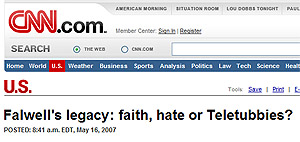 I don't agree with everything the late Rev. Jerry Falwell said or did, but I want to
defend him against posthumous slander.
He did not, as far as I can determine, promote "hate."
I don't agree with everything the late Rev. Jerry Falwell said or did, but I want to
defend him against posthumous slander.
He did not, as far as I can determine, promote "hate."
I do consider
Dr. Falwell a somewhat eccentric person who has said things publicly that are not in line
with any widely held variety of Christianity (e.g., he claimed to have private knowledge
about the prophesied Antichrist). He was provocative and even divisive.
However, as far as I can tell, he was not
a hatemonger, and accusing him of "hate" is a serious accusation that needs to be backed
up with evidence, not just tossed around as a buzzword.
Plenty of conservative Christians disapprove of various kinds of behavior
without "hating" the
people who engage in it or advocate it.
Indeed,
our marching orders
tell us not to hate anyone.
Apparently, to some people, including this CNN headline writer,
"hate" simply means "failure to toe the liberal line."
(The word "hate" does not occur in the body of the article.)
Sadly, one of the reflexes of the knee-jerk Left is to accuse its critics of "hate."
And that's a hateful thing to do.
Disagreement is not hate. Even divisiveness is not hate. Can we get that clear?
Permanent link to this entry


|

|
2007
May
16
|
Windows Vista has insulted my daughter
"This copy of Windows is not genuine" — false
It is a severe breach of etiquette to accuse someone of a crime without
convincing evidence. But that's what Windows Vista
did to Cathy
on Tuesday night.
Cathy has built herself a new computer with a 3-GHz Pentium D and 64-bit Windows Vista.
The good news is that it works beautifully and gave her a factor-of-9 speedup of
graphics rendering in World of Warcraft with the same graphics card.
Dual-core CPUs are a Good Thing.
But the installation process had a very unpleasant rough spot.
She bought the System Builder (OEM) version of Vista with her new motherboard.
When Vista went online to activate itself, something went wrong, and up popped
a message, "This copy of Windows is not genuine," followed by a long
tirade about the evils of buying pirated software at flea markets.
Also, Windows was partly locked down,
with most Control Panel settings
unavailable — including the one to re-enter the Product Key, which she
thought she had mistyped.
As Windows updated itself online, the problem disappeared as mysteriously
as it had come. I presume the culprit was some kind of bug in the authentication
system.
And that's the problem with relying on online authentication — it can
fail, it can misbehave, and it can even be tampered with! I don't appreciate this
new point of unreliability in Windows.
Already, there are reports that
very little piracy is being stopped by this authentication mechanism —
the bulk of the "not
genuine" messages are thought to be false alarms.
We've been through this before.
Microsoft's system for keeping track of remote desktop user licenses became
so cumbersome
they eventually just gave up on it
and instituted an "honor system."
Part of Windows authentication may need to go the same way.
Although I fully respect Microsoft's
intellectual property, I think they need to remember that sometimes you have
to tolerate some misuse rather than lose the good will of honest people
who happen to be your customers. Microsoft has already dealt itself a public
relations blow by
saying
that open-source software is violating its patents,
but not saying which patents. No more FUD, people.
Just to be clear: I am not chauvinistically pro- or anti-Microsoft. I like some
Microsoft products very much (such as the C# language, .NET Framework, and Visio)
and dislike others
(such as Word, but I have to use it for interoperability with other people).
I haven't made a careful study of their corporate management or sales tactics,
and I'm not going to swallow one-sided accounts (pro or con) that occasionally
appear in the media.
Further thought: If I were an international terrorist organization (which I'm not),
or a hostile foreign power,
I'd be willing to spend money to foul up this authentication system
so that vast numbers of American computers would get locked down
at a strategic moment of my own choosing.
This might involve corrupting some people at Microsoft's headquarters.
Every man has his price, and if you could get $100,000,000 for doing something that would
put your employer out of business and require you to go into exile, would you?
That amount of money is not beyond our enemies' budgets.
It is less than the cost (to us) of one day of the Iraq war.
Permanent link to this entry
My best book?
|
Of all the books I've ever written, the one I most enjoyed writing, and the one
I think may be my best work, is not selling very well.
Celestial Objects for Modern Telescopes is
a book I daydreamed about writing when I was 12 years old. I finally wrote it
in 2001. It got a rave review in the Times Educational Supplement written by no
less than Sir Patrick Moore (the man whose books I was reading when
I was 12 years old). But it didn't take the world by storm.
Get it now before it becomes a rare collector's item.
|
|

|
Permanent link to this entry
Miscellany
Look at this collection of old telephones.
The ones you actually remember are the varieties of Western Electric 300 and 500.
And look at the worst
translation ever to appear on a public road sign.
How did "Cyclists dismount" get rendered into Welsh as "bladder disease has returned"?
The mass media — both the BBC and CNN — are finally daring to
criticize the Scientologists,
and they're getting flak in return.
You can also find some juicy but unverified criticism of the Scientologists
in Wikipedia.
Permanent link to this entry


|

|
2007
May
15
|
Recommended reading
Instead of reading my blog today,
read Cathy's.
Permanent link to this entry


|

|
2007
May
14
|
Natural air pollution in Valdosta

Our friend Susan Davis sent this picture, taken looking south on Patterson Street
in Valdosta, Georgia, around 10 a.m. on Saturday (May 12).
This would be a familiar scene if you could see the court house
in the middle of the picture. It's not visible.
The smoke is from wildfires in
the Okefenokee Swamp area. Near Valdosta, parts of I-75 have been shut down.
I'm glad I'm not back in my old home town right now!
Permanent link to this entry


|

|
2007
May
13
|
Least useful programming language feature?
Unless it serves some purpose I'm not aware of, the least useful programming
language feature I've seen lately is the unary plus operator in C#
(and, presumably, numerous related languages).
Most languages have a unary minus, which means you can put a minus sign
in front of a number to flip its sign. If X is positive, -X is negative, and
vice versa.
C# also lets you put a plus in front of a number, so in place of X you
can write +X. What's the difference? None. In particular, the plus does not make
negative numbers positive as you might imagine. The value of +X is the same as
the value of X.
So why did they give us the plus at all?
Permanent link to this entry
The loop-and-a-half problem
Here
is a copy of an insightful paper by
Eric S. Roberts
about the "loop-and-a-half problem" in structured
programming. (Another link is here.)
A loop-and-a-half is what you have when your program does something like this:
loop
read input X;
if X = something exit loop;
process X;
end loop
This is easy to code in a C-like language (including C#) by using a break
statement to exit the loop in the middle.
Structured programming purists, however, object to departing from a loop in the
middle. Loops, they say, should exit only at the end;
this makes it easier to see the flow of control.
The really puristic way to code the "loop and a half" is like this:
read input X;
loop while X ≠ something:
process X;
read input X;
end loop
Now the loop ends only at the end, when its while condition becomes false,
but you have to repeat the "read input X" operation (which could be complex).
Also, as Roberts points out,
a human being reading the program from the start will not realize
"read input X" is going to be repeated.
It would be better, he argues,
to write things down in the order in which we think about them.
A C-like idiom that achieves pure structured programming, but which I dislike
for other reasons, is the following:
while ((X = Console.ReadLine()) ≠ something)
{
process X;
}
What bothers me about this is the assignment in the middle of the expression.
The loop test, ((X = Console.ReadLine()) ≠ something),
has the side effect of storing a value in X. So although we've achieved
neatly structured flow of control, we are doing something distinctly messy
with data.
So why is Mr. Roberts' paper interesting? Because he cites an actual
study of the errors made by beginning programmers, which found that
letting people exit a loop in the middle is a Good Thing.
It is less error-prone than any of the alternatives.
And isn't reduction of errors what structured programming is all about?
He also cites introductory programming textbooks that introduce the algorithm
the way we naturally think about it (with the loop exit in the middle) and
then clumsily transform it into pure structured programming.
Surely it is better for programming languages to accommodate us than
for us to have to accommodate them.
Permanent link to this entry
Miscellany
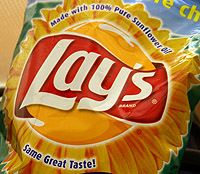 Beware of "0g trans fat," sunflower oil, and Olestra.
Those sunflowers on potato chip bags
are a sign of danger.
The trouble with those "healthy" substitutes for cooking oil
is that some of us can't digest them at all.
The way trends are going, I will soon be completely unable
to eat potato chips. Small loss, I suppose.
Beware of "0g trans fat," sunflower oil, and Olestra.
Those sunflowers on potato chip bags
are a sign of danger.
The trouble with those "healthy" substitutes for cooking oil
is that some of us can't digest them at all.
The way trends are going, I will soon be completely unable
to eat potato chips. Small loss, I suppose.
Now that it's easy to make interactive software by just moving
the windows and buttons around, we're falling victim to a new
generation of inept programmers.
Have you noticed that some web pages require you to type your
phone number with hyphens (706-555-5555),
and others require you to leave out the hyphens (7065555555),
and very few will accept both formats?
That's because too many programmers can't be bothered to convert
the number into the desired format in software. Read
Jeff Duntemann's remarks.
Maybe it's another instance of, "Let's make the customer do more work!"
Even though people offer courses in it,
in my opinion
search-engine marketing is a non-subject.
Label your web page truthfully, and the search engines will find you.
And if you have any honesty and common sense at all, you'll realize that you
don't want to trick the search engines. If you're selling aardvarks,
you only want customers who are looking for aardvarks; there's no point
in trying to snag thousands of non-aardvark-seekers.
And that's the difference between the Internet and Madison Avenue.
20th-century advertising was based on getting your message to everybody
and manipulating the whole public.
The 20th Century ended a while back.
Permanent link to this entry


|

|
2007
May
12
|
PL/I Lives!
PL/I lives.
You can buy compilers for Windows and develop programs that also compile
and run on IBM mainframes.
PL/I was my favorite programming language of the 1970s —
although I never mastered the whole thing, and neither did anyone else.
Designed by a committee, PL/I was IBM's heroic effort to combine the
features of FORTRAN, COBOL, and ALGOL.
It broke a lot of new ground, and most importantly, it was the first
ALGOL-like language to achieve wide popularity, thus helping to usher in
the era of structured programming.
A much simpler alternative ALGOL derivative, Pascal, later won out and evolved into
Borland Delphi; and I would argue that C# is Pascal in C's clothing.
Permanent link to this entry


|

|
2007
May
11
|
Canon EOS 10S film camera
The other day I bought, from a University colleague, a somewhat battle-worn but still lively
Canon EOS 10S
film camera. This will enable me to do
film astrophotography
with my Canon lenses and accessories.

This is one of the earlier EOS cameras and has the unusual ability to
make long exposures without running down the battery; power is used
only to open and close the shutter, not to hold it open.
There is no cable release socket — instead you must use the
RC-1 infrared remote controller (which, handily, also works with my Digital Rebels).
And the film goes through this camera forward; it's not like later film EOS
cameras which advance the film all the way out of the cartridge and then take
pictures in reverse order, rewinding them into the cartridge one by one.
The latter system has its advantages; if you accidentally open the camera, you
only fog unused film, not pictures you have taken. But it wreaks havoc with
everyone else's numbering system.

Here's the first astrophoto taken with it. I know this isn't impressive. Just to see if
the camera worked, I loaded it with outdated Fuji Neopan 400 film. This is the globular
cluster M3 through the 8-inch telescope. You're looking at a digital combination of
two 15-minute exposures, processed in MaxIm DL and Photoshop.
For a digital image (also not great, but acceptable), click
here.
Permanent link to this entry
50 years of Helvetica
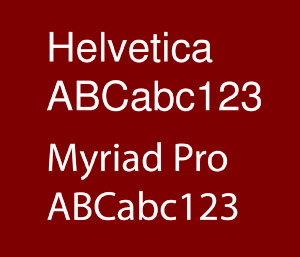 This year is the
50th anniversary
of the Helvetica typeface, which, to people of my generation, is practically
synonymous with modernity. Sans-serif type was rather uncommon in the world before
1957, though the Brits did have
Gill Sans,
the Germans had occasionally used
Akzidenz Grotesk
since 1896,
and everybody had crude sans-serif type for use on road signs, labels, and the like.
This year is the
50th anniversary
of the Helvetica typeface, which, to people of my generation, is practically
synonymous with modernity. Sans-serif type was rather uncommon in the world before
1957, though the Brits did have
Gill Sans,
the Germans had occasionally used
Akzidenz Grotesk
since 1896,
and everybody had crude sans-serif type for use on road signs, labels, and the like.
For an interesting classification of sans-serif fonts see
this Wikipedia article.
In the last few years we've seen a strong shift away from Helvetica and its imitators
toward more readable sans-serif fonts with more variation of line width,
such as Frutiger.
Current Microsoft and Adobe products are pushing this with fonts such
as Adobe Myriad
and Microsoft Segoe UI;
the latter is the user interface
font for Windows Vista.
Melody, who once studied type design with
Arnholm,
is fond of saying that
in type design you can't be totally creative — you have to use
an alphabet other people will already recognize. That may be why typography
has prospered in the 20th Century while "modern art" has mostly led to confusion.
Finally,
this is the only
music video in praise of a typeface
that I've ever seen.
Permanent link to this entry


|

|
2007
May
10
|
Subtropical Storm Andrea

Just after I noticed and captured this nice satellite image of a dramatic-looking cyclone,
the National Weather Service named it Andrea.
The storm season is starting out early this year.
Permanent link to this entry
Nuisance calls at work
Another
person who doesn't believe
there is such a thing as a wrong number
has entered my life.
At work, someone with a foreign accent is calling
one of our rarely-used lines every couple of hours and
asking for a woman named K... F... (you'll understand why in this case I don't
give the real name). He won't take anyone's word that this is not her phone
number (and still won't be when he calls back). He just calls again, over and over.
I can't tell whether it's a stupid local person, or a bill collector who is
being paid for making the calls whether or not anyone answers.
I've instructed everyone to quiz him the next time he calls.
We don't take calls from people who won't identify themselves.
Update: The next day we got 2 calls, and since different people answered them,
we don't know if it was the same caller. One claimed to be calling
for "Matrix Media" (I've found 4 companies
with this name) and the other, for "International Travel Connections"
(name of a big British travel agency that he almost certainly was not
actually representing).
Each caller asked for "K..." and each was surprised to learn that there is
no such person here. I can't tell whether this is marketing or harassment,
but either way, it isn't working.
Permanent link to this entry


|

|
2007
May
9
|
Miscellany
How not to defend your dissertation
(cartoons by Kerry Soper).
More bugle calls than you've ever heard before.
I particularly like the musically minimalist one for "Overcoats."
And I regret that, while out there last month, I didn't see
Colorado
Springs' architectural oddity (a house enhanced by the addition of the
fuselage of a 727).
Permanent link to this entry


|

|
2007
May
8
|
Again pestered by Dish Network
Dish Network's promise to
stop calling my daughter's cell phone
(and asking for one Richard Hoyt, whom I have never heard of)
is not worth the paper it's not printed on.
Yesterday (May 7) they called again.
I had another of those frustrating conversations ("Please stop calling me Mr. Hoyt!").
Today's bit of illogic was that "only Mr. Hoyt can authorize changes to his account"
and thus they can't take Sharon's phone number off it, even though they know it's the wrong number.
I got it out of them that they're calling to collect a debt.
Good. That means they're violating the Fair Debt Collection Practices Act,
not the Do Not Call Act, and they owe me $1,000 plus actual damages, not $500.
I'm going after them with
guns a-blazing (metaphorically speaking!).
The public needs to be protected from these pests.
Permanent link to this entry
Let's call them what they are: Apple's deceptive ads
Until now, I don't think I've attacked a major computer company in this Notebook.
In general, I am not a chauvinist about manufacturers.
I happen to be using Microsoft Windows a lot because it meets my needs, but I have no
blind loyalty to Microsoft. I've always considered it important, as a point of
professionalism, to know about all the tools available to me, and to evaluate
everything on its actual merits.
But have you seen the TV commercials in which men stand around and two of them
say "I'm a PC" and "I'm a Mac"?
(Some are on line here.)
They proceed to tell you that PCs crash all the time (and Macs don't),
that PCs are generally unreliable,
and (most recently) that Windows Vista is annoying and worthless.
For a while, I figure they got away with it because "PC" isn't the name
of a specific manufactured product. It's certainly true that some
PCs are shoddily made and crash-prone. They could claim they're talking
about those few.
But now they're attacking Windows Vista, which is a specific Microsoft product,
and saying false things about it.
Vista does not ask you for confirmation every time you do anything —
not unless your computer is full of viruses and spyware.
Vista does not break your existing software.
Windows systems do not crash all the time; we reboot our Windows servers
every three months whether they need it or not.
Let's call this what it is: deceptive advertising.
And, as TV critics say, I think the Macintosh has
jumped the shark.
Why can't Apple sell the Macintosh on its merits?
And do they think their potential customers are dumb enough to believe the current,
negative campaign? The world is full of PCs that work better than Apple says they do.
Goodbye, credibility.
Addendum: I'm not the only person who thinks this.
See this page
and scroll down to the middle for a checklist of apparently false messages conveyed by
the Apple ads.
Here's another critique,
this one from a Mac fan.
And here's
another.
(One can perfectly well believe that the Mac is superior and yet that the ads are
deceptive. They should be pushing the Mac's real advantages instead of attributing
imaginary faults to PCs.)
And we mustn't forget that one of the reasons Macintoshes are "simpler" is that
there isn't as much software for them, and never has been, and never will be.
Permanent link to this entry


|

|
2007
May
7
|
Famous evangelical Protestant becomes Catholic
Reformation re-fought in blog comments
Prominent evangelical Christian philosopher
Francis Beckwith has
left Protestantism and returned to the Catholic faith
of his youth.
This event has sent ripples through the American evangelical community, and you can see all
the major points of view by reading the comments at the bottom of
his blog entry.
It was very courageous of him to allow comments.
An "evangelical"
is a Christian of a particular sort, emphasizing the authority of the Bible and
the need for everyone to make a personal commitment to Christ (not just belong to a church).
Evangelicals are mostly conservative Protestants. I am one.
Accordingly, I should be in this on the Protestant side, but I'm loath to condemn Beckwith
for his decision, which he certainly made with his eyes open.
He maintains that he can be both Catholic and evangelical. As such, I think he will be a very
good influence on the Catholic Church. Perhaps one way God is reforming
that church is by means of an
influx of people with Protestant education (including, to some extent,
the present Pope).
Also, someone asks the obvious question — why should evangelicals be more loyal to
the "church fathers" Luther and Calvin than to much earlier ones such as Augustine and Origen?
Indeed, as a Baptist I am pleased to see my own church somewhat
distancing itself from Calvinism
and preferring the higher authority of the Bible.
Indeed, on the issue of Church Fathers, some Protestants apparently believe that Christianity became
corrupt immediately upon the death of the Apostles, so that even the earliest "Fathers" were seriously
in error, and biblical doctrine wasn't restored until Luther's time. This is not plausible to me.
For one thing, it is the "Fathers" who assembled the Bible!
I should add, however, that Roman Catholic distinctives such as papal infallibility and indulgences
are much harder to defend. They
seem, to me, to be quite far from both the Bible and the early Fathers.
Permanent link to this entry


|

|
2007
May
6
|
Vintage Motorola mobile 2-way radio
Right after I got my ham radio license (N4TMI)
in 1988, I bought, second- (or third- or fourth-) hand,
a vintage 1966 Motorola 2-way radio exactly like the one my father had had in his patrol car
when he was an ATF agent. Mine, of course, had been converted to the 2-meter ham band,
and I installed it in our aging Toyota.
This evening I gave this relic, er, priceless antique to my nephew, Aaron Paul, KI4TMB.
He's probably going to install it on his golf cart as a curiosity.
This radio consists of a control head that mounts on the dash and a big box that
you mount in the trunk; they are linked by cables. The big box (here shown without its
outer cover) contains dozens of vacuum tubes, as well as a transistorized "T-power"
power supply to step the incoming 12 volts up to about 250.
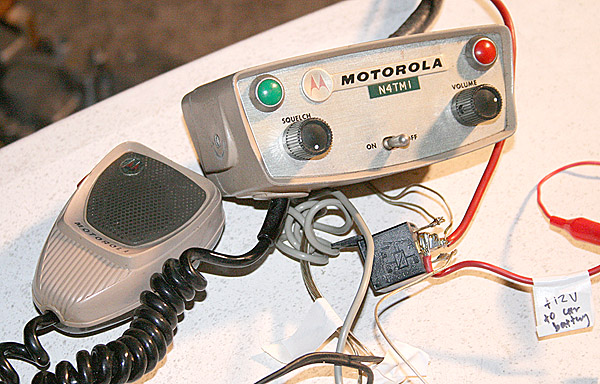

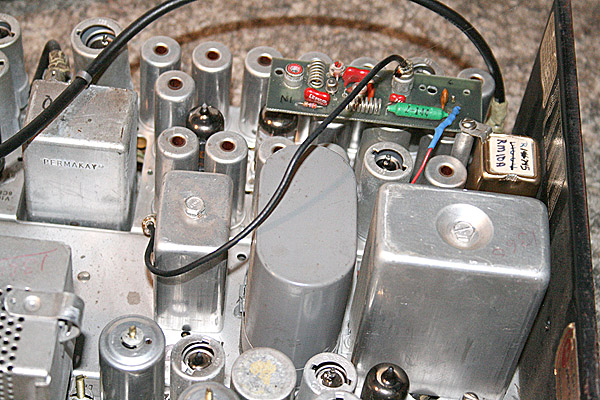
In the second picture you see my dummy antenna, with orange-and-brown resistors, connected in
place of the antenna, and in the third picture, you see a MOSFET receiver preamp (given to me,
if memory serves me right, by Bob Richards, AA4AI) on a small printed circuit board, not
connected.
After about 10 years in storage, it still works. Aaron and I put it together
on a table and tried it out this evening. This 41-year-old radio has never had a major repair
as far as I know. It was built to last!
Nota bene: I do not have any further information about these vintage Motorola radios.
At the moment I can't find the instruction manual, and when I do, it will go to Aaron.
This radio is model U43GGT-1100C, a slight precursor of the "Motrac" line; it has
a 1966 manufacturing date stamped in it. Some information about old Motorola mobile radios
is available here.
Permanent link to this entry
Bamboozled by jumper cables
To power up the radio for testing, Aaron and I used jumper cables to get power from the battery
of his car. (We needed 12 volts at 10 or more amps, and this was the best way to get it.)
My tactic was to clip the jumper cables to a block of wood, then clip other, smaller wires to them.
The block of wood provided insulation and held the big clips in place.
Well... I kept ending up with no DC power at the destination. After a while I became convinced
that I'd been carrying around a defective set of jumper cables. So we borrowed Cathy's jumper
cables and had the same problem.
The explanation? Unlike an ordinary alligator clip, a jumper-cable clip has only half of
its teeth connected to the wire. The other set of teeth is not connected to anything.
And of course with a piece of wood between them, they're not connected to each other!
(Apparently, paint prevents current from flowing through the clip as a whole; this is
a good thing, to guarantee that it won't get hot.)
I was, of course, using the teeth on the wrong side.

Permanent link to this entry


|

|
2007
May
5
|
Pestered by Dish Network
How not to run an automated message system
Minor revisions May 5.
Richard Hoyt, we don't know who or where you are, but my
daughter Sharon has been getting your phone calls.
Specifically, she has gotten at least 8 calls from a machine at
Dish Network
that wants to talk to you.
The machine says, "If you are Richard Hoyt, press 1." Since we are not
Richard Hoyt, we do not press 1. The machine immediately hangs up and
calls again later.
On May 3, acting on Sharon's behalf, I called Dish Network's 800 number.
It prompted me for a 16-digit account number and didn't want to let me do
anything else until I entered it.
I don't have an account number.
Eventually I was able to use the standard trick for bypassing an automated
phone menu, which is to press 0 at some random time
(not while being prompted for 16 digits).
There ensued a rather frustrating conversation. "Please stop calling me 'Mr. Hoyt.'
I am not Mr. Hoyt. No, I don't know where Mr. Hoyt is. I am calling to tell you that
you have the wrong telephone number for Mr. Hoyt."
Eventually I got Dish Network to agree to stop calling.
I also put in an
FCC complaint
about their use of an automated calling machine.
Automated calling is heavily restricted, and Dish Network's system is
set up so that once a wrong number gets into their system,
they will call it over and over, endlessly. That has to be against regulations.
This is probably a manifestation of a more widespread problem, which is that
some people can't believe there is such a thing as a wrong number.
Have you ever had someone call you by mistake, and then argue with you
because you're not the person they wanted? Now Dish Network has a machine doing that!
Artificial stupidity is very easy to computerize, and they've done it.
Permanent link to this entry


|

|
2007
May
4
|
Curiosities of the day
There is presently a
tailless, wingless Boeing 737 standing abandoned
in
the middle of a road in Bombay.
It was being trucked to a new location — an operation a lot
like moving a house — when the driver encountered an overpass
that he could not go under.
He then took advantage of
the
anonymity of India
and simply disappeared.
Southwest England suffered a terrible flood in 1607
which is now
thought
to have been a tsunami.
And the sovereign
nation of Sealand
(which is also an
Internet regulatory haven)
bravely carries on after a
devastating
fire that destroyed almost the whole place, which is an
abandoned British offshore fortification.
Permanent link to this entry


|

|
2007
May
3
|
The sad end of WMGA (AM), Moultrie, Georgia
When I was about 6 years old, in the early 1960s, one of the landmarks
of Moultrie, Georgia, was radio station WMGA, located
just outside town
on the road to Tifton. It looked like a 1930s frame house with a neat sign in front
and an impressive array of towers in the large, swampy back yard.
When in Moultrie in February, 2006, I saw the station in ruins — a decaying,
vacant building with
towers behind it. At least I think the towers were still there.
Some idle web searching brought me to the rest of the story.
This radio station didn't just go out of business, it had its
license revoked.
Charges included failing to maintain the red aircraft warning lights on top of the towers,
failing to keep the towers painted red and white as required for aircraft safety,
and transferring control of the station to other people without permission.
When last heard from on the Web, WMGA was calling itself La Favorita and
was apparently networked with some Spanish-language AM stations in Atlanta.
This is a long way from the relatively dignified small-town radio station of the 1960s
that often broadcast instrumental music.
Apparently, its transmitting frequency was 1400 kHz in the 1940s,
possibly 580 kHz some time later,
and 1130 kHz when it last operated.
One of WMGA's DJs,
Ron O'Quinn,
made his way to a British offshore broadcaster,
Radio England,
that operated briefly in 1966.
In those days, there was no commercial radio in England, and several groups of people
set up unlicensed commercial stations on ships at sea.
This one positioned itself as "American-style" and apparently went through a phase
of using only American announcers.
This video/audio clip
makes it clear that Radio England was very much like AM radio in South Georgia during
the height of the "Top 40" era.
Permanent link to this entry


|

|
2007
May
2
|
A comet and Jupiter too
Later the same evening, or rather, early on the morning of May 1,
I succeeded in getting this image of
Comet Lovejoy C/2007 E2, which was the first comet to be
discovered using a DSLR.
Australian amateur astronomer
Terry Lovejoy
discovered
the comet on March 15 using a Canon EOS 350D and 200/2.8 lens.
The comet has moved further away from the sun, so
my picture is much worse than his, and is presented in black-and-white.
It's a single 30-second exposure, with dark frame subtraction,
at ISO 800 in bright moonlight with a 300-mm f/4 lens.
The image was processed with MaxIm DL, Photoshop, and Neat Image.
This is not the whole picture, just a small central area.
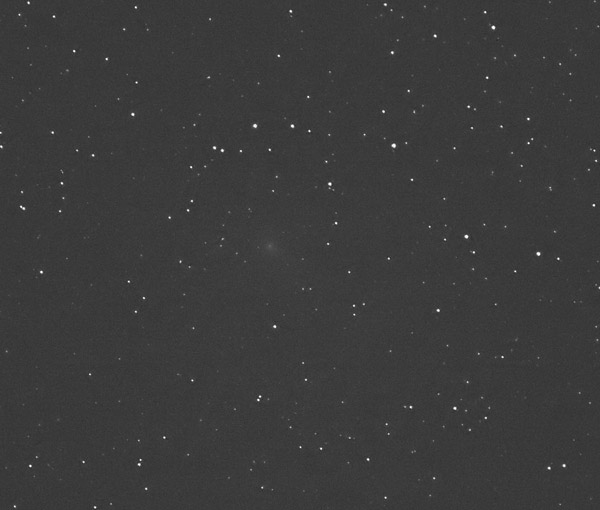
Afterward I also took some video of Jupiter, which was low in the sky and gave a much
less steady image than Saturn high overhead.
This is a stack of 2250 video frames, somewhat overprocessed, leading to some
spurious streaks concentric with the edge of the planet.
The satellite that you see is Ganymede.

Permanent link to this entry
The state of computer science
Here is
an interesting article by Niklaus Wirth (the inventor of Pascal and many other things)
about good and bad ideas in the development of computers.
Here
is a brief response with which I entirely agree.
Meanwhile, for several years fewer and fewer students have been majoring in computer science.
I think this reflects four things.
First, "computer science" defined itself much more narrowly than computers, and much of what's
exciting about computers now happens outside that field.
Second, everybody found out that it's hard work to understand what really goes on inside a
computer — you don't get a degree for just knowing how to run commercial software.
There had been a huge rush of would-be computer-science majors in the 1980s, many of whom had no
idea what they were getting into.
Third, "weeding out" may have worked too well.
Nationally, CS departments set out to "weed out" their weak
students, and they succeeded in getting
rid of a lot of people just as demand was starting to fall off.
And, fourth, sadly, Americans don't want to be engineers.
How is it that Georgia has the same number of state engineering universities that it had in 1885,
while the rest of the state college system has expanded a hundredfold?
Permanent link to this entry


|

|
2007
May
1
|
More wildfires visible from space
Here are some NASA satellite pictures, enhanced by me, of the two
South Georgia wildfires. The first one is the one I posted last month.
As you can see in the later pictures, the second (Atkinson County) fire,
on the left, now seems to be putting out more smoke than the original one.

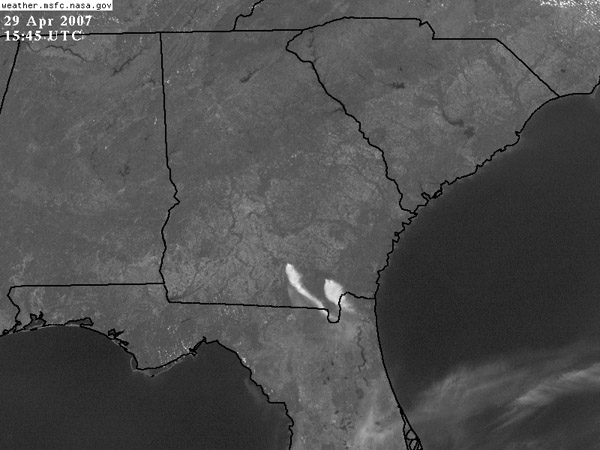


In the last picture, the smoke seems to be interacting with the natural
formation of cumulus clouds.
Permanent link to this entry
My best Saturn yet
Yesterday evening, I set up my telescope and took a quick look at Saturn high overhead.
The air was unexpectedly steady, so I quickly put the ToUCam in place of the eyepiece
and captured 1500 frames of video. The best 1200 of these were then stacked and enhanced
with RegiStax 4, and here's the result.

Here's a high-contrast version of the same picture, showing that at least 3 satellites
of Saturn were captured:

Not bad for an 8-inch telescope, is it? Meade 8-inch (20-cm) LX200,
Celestron Ultima 2x Barlow lens,
Baader UV/IR-block filter, and Philips ToUCam Pro.
Permanent link to this entry


|

|
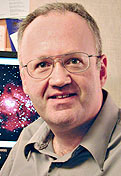




















 I don't agree with everything the late Rev. Jerry Falwell said or did, but I want to
defend him against posthumous slander.
He did not, as far as I can determine, promote "hate."
I don't agree with everything the late Rev. Jerry Falwell said or did, but I want to
defend him against posthumous slander.
He did not, as far as I can determine, promote "hate."


 Beware of "0g trans fat," sunflower oil, and Olestra.
Those sunflowers on potato chip bags
are a sign of danger.
The trouble with those "healthy" substitutes for cooking oil
is that some of us can't digest them at all.
The way trends are going, I will soon be completely unable
to eat potato chips. Small loss, I suppose.
Beware of "0g trans fat," sunflower oil, and Olestra.
Those sunflowers on potato chip bags
are a sign of danger.
The trouble with those "healthy" substitutes for cooking oil
is that some of us can't digest them at all.
The way trends are going, I will soon be completely unable
to eat potato chips. Small loss, I suppose.


 This year is the
This year is the












